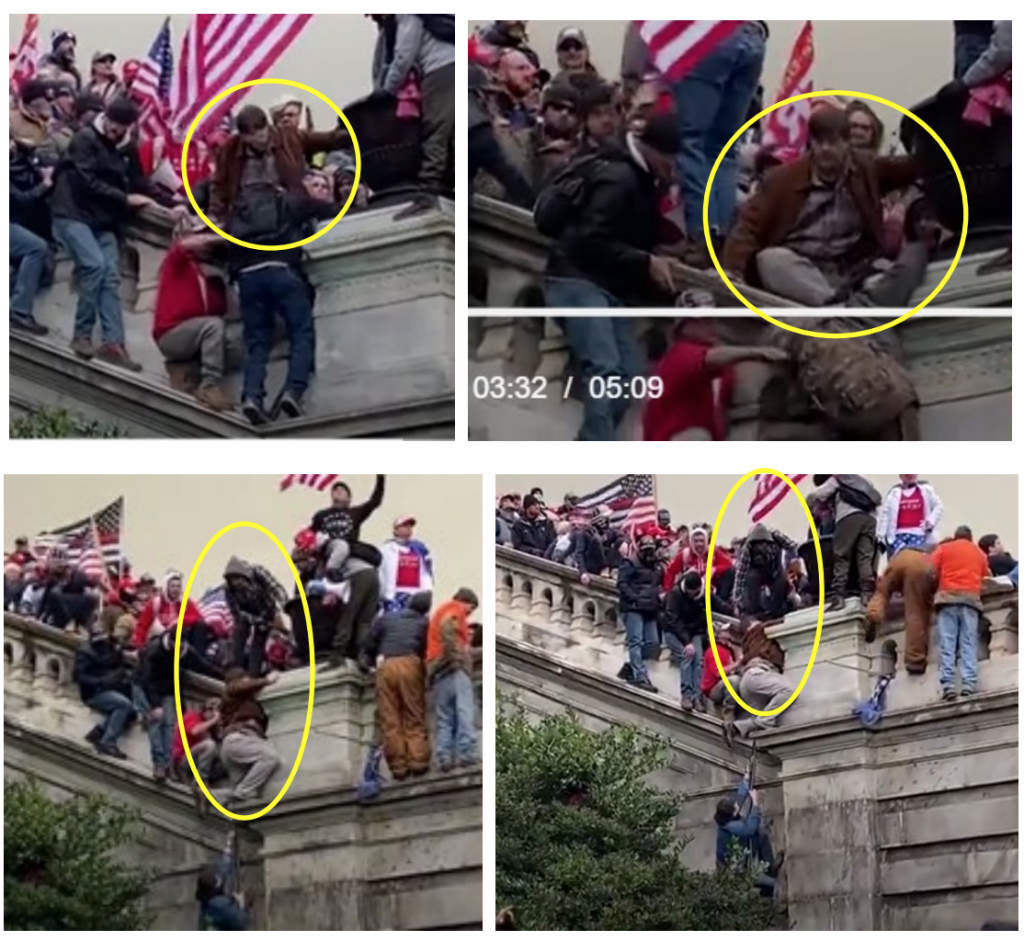Subscriber Benefit
As a subscriber you can listen to articles at work, in the car, or while you work out. Subscribe NowThe Indianapolis attorney convicted of two federal misdemeanors for entering the U.S. Capitol on Jan. 6, 2021, has been sentenced to 12 months of probation that includes six days of intermittent confinement.
Quentin G. Cantrell must also perform 100 hours of community service and pay a $35 special assessment, $500 in restitution and a $6,000 fine. His intermittent confinement must be served for two consecutive weekends.
Judge Trevor McFadden of the U.S. District Court for the District of Columbia imposed the sentence Monday after Cantrell, 55, was convicted in April of misdemeanor counts of entering and remaining in a restricted building and parading, demonstrating or picketing in a Capitol building.
At Cantrell’s bench trial in April, McFadden found him not guilty of two other misdemeanors: disorderly and disruptive conduct in a restricted building and disorderly or disruptive conduct in a U.S. Capitol building or grounds.
Story continues below

Cantrell had been facing up to one year in prison, one year of supervised release and a $100,000 fine on the entering and remaining count, and up to six months in prison plus a $5,000 fine on the parading count.
The government had requested that he receive 60 days of home detention, three years of probation, 120 hours of community service, a $10,000 fine and $500 in restitution.
Separately, Cantrell’s law license has been administratively suspended for failure to comply with Indiana Admission and Discipline Rules relating to attorneys’ annual registration fee, IOLTA certification and continuing legal education requirements. The suspension went into effect Monday, the same day he was sentenced.
Cantrell was arrested in March 2022 alongside two of his relatives, Jared and Eric Cantrell, known in court documents as the “Cantrell Cousins.”
According to the U.S. government’s sentencing memorandum, the Cantrell Cousins traveled to Washington, D.C., to attend the Jan. 6, 2021, “Stop the Steal” rally, where conservative activists argued that the 2020 election had been stolen from then-President Donald Trump. The trio then walked to the Capitol Building, where rioters gained entry and attempted to stop the certification of now-President Joe Biden’s electoral victory.
The Cantrells had to pass broken police barriers as they made their way to the Upper West Terrace of the Capitol, according to the government’s memorandum. They then “spent approximately 19 minutes on the Upper West Terrace observing the chaos unfolding outside of the U.S. Capitol Building.”
Once on the terrace, the Cantrells passed broken police barriers, a makeshift barricade and a line of police officers in riot gear, according to the government.
At 2:37 p.m., a Capitol police officer is seen on video telling an individual that no one is allowed inside the Capitol building. At the same time, the Cantrells entered.
“The Cantrells did not go through security and there was no indication that anyone was permitted to enter the Capitol building that day. To the contrary, alarms were blaring and the door was clearly marked ‘Emergency Exit Only,’” according to the government’s filing.
Quentin and Eric Cantrell exited the Capitol two minutes later, at 2:39 p.m. Despite seeing “a massive police presence on their left, beyond the broken police barriers and makeshift barrier erected by rioters,” Quentin and Eric remained on the Upper West Terrace for approximately another six minutes after exiting the building.
“At 3:07 pm, they attempted to climb over the stair wall and down to the ground. Quentin Cantrell chose not to climb down all the way to the ground and instead remained on the stairs, but Eric Cantrell climbed over the wall and lowered himself to the ground below,” the government wrote.
Story continues below

In urging the imposition of 60 days of home detention, three years of probation, 120 hours of community service, a $10,000 fine and $500 in restitution, the government highlighted Quentin’s legal career and alleged lack of remorse.
“One of the most importance factors in Quentin Cantrell’s case is his lack of remorse,” the government wrote in its sentencing memorandum. “Cantrell, an attorney, walked past repeated and obvious signs the Capitol building and grounds were restricted, then spent 19 minutes on the Upper West Terrace watching the chaos unfold. He then walked past more damaged barriers and observed a makeshift barrier erected between rioters and police and still entered the Capitol through a door with a blaring alarm and a sign stating, ‘Emergency Exit Only.’”
Elsewhere in its memo, the government wrote that it was “very concerned about Quentin Cantrell’s lack of taking responsibility and absence of expressing remorse for his actions on January 6. … Cantrell’s lack of remorse is further compounded by the fact that he is a practicing attorney and has been for more than 20 years.”
In his own sentencing memorandum, Quentin — represented by attorney David Issa of Houston — wrote that he “prefer(red) to address the Court directly and in person … .” Thus, rather than responding to the government’s requested sentence, he submitted six character references, including two from attorneys at his former firm, Woodard Emhardt Henry Reeves & Wagner.
Attorneys Spiro Bereveskos and Steve Zlatos each wrote that they had worked with Quentin for more than 20 years. Indiana Lawyer determined at the time of Quentin’s arrest that he had been practicing at Woodard, but he was removed from the firm’s website the day after the arrest was announced.
Bereveskos wrote that Quentin “has always struck (him) as an ethical lawyer who would not lie or take inappropriate short cuts.” He also credited Quentin for helping him secure a victory in a case in excess of $150 million.
Bereveskos noted he was writing “based upon (his) personal experience with and opinions of Quentin.”
For his part, Zlatos — who signed his letter as honorary consul for the Slovak Republic in Indiana, Kentucky and Tennessee — said in his experience working with him, Quentin “consistently demonstrated to me his commitment to high standards of ethical and moral behavior. To my knowledge he never once was the subject of any disciplinary action or complaint.”
“I understand the seriousness of the events which occurred at the Capitol during the January 6 demonstrations,” Zlatos wrote, “but it is my hope that you will consider my letter of reference and Quentin’s good character and many years of honorable service to society and grant him leniency in his sentencing.”
Quentin’s sentencing memorandum also included two letters from friends, as well as two letters from individuals with whom he has worked as part of Saints Constantine and Elena Orthodox Church in Indianapolis. The latter letters discussed Quentin’s work with the church’s school, Hagia Sophia Classical Academy, where he has taught and for which he worked to obtain accreditation.
Also, Robert Kelsey, who has known Quentin since middle school, wrote about how the legal proceedings have affected Cantrell.
“I have seen the distress this issue has caused him, taking over his life and already costing him his position at his law firm,” Kelsey wrote. “I do not believe he had any intention in going to cause trouble to anyone, as I think can be shown by the speed with which he left the situation as quickly as he did. I hope that you will take into consideration Quentin’s good character and what he has already gone through.”
Indiana Lawyer was unable to locate a live video or audio stream to watch the sentencing hearing, where Quentin was expected to speak.
For his part, Eric pleaded guilty to a charge of parading, demonstrating or picketing in February. He was sentenced in March to three months’ probation and 40 hours of community service.
Jared was convicted at a bench trial on the same charges as Quentin, as well as a third charge of disorderly and disruptive conduct in a restricted building. He was sentenced Monday to an aggregate term of six months, followed by 12 months of supervised release.
As a condition of his supervised release, Jared must serve four months of home detention. He was also ordered to pay a $60 special assessment, $500 in restitution and an $8,000 fine.
Like Quentin, Jaren was also ordered to perform 100 hours of community service.
Please enable JavaScript to view this content.

